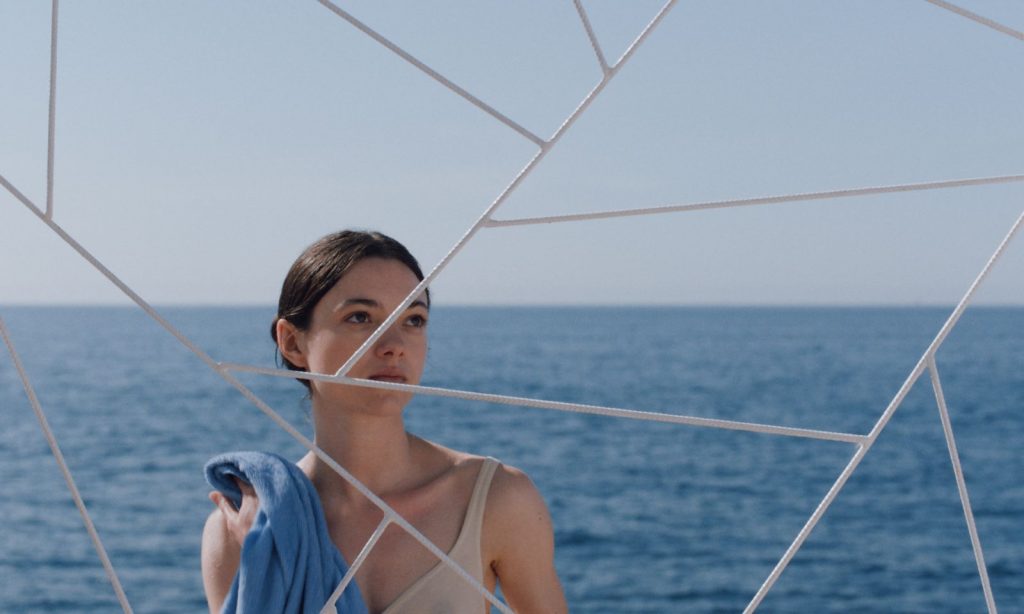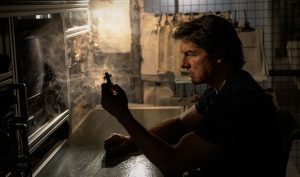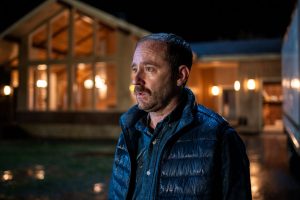Reviews include Mission: Impossible – The Final Reckoning, Lilo & Stitch, and Bad Shabbos.
TFCA Friday: Week of May 2
May 3, 2025

Welcome to the TFCA weekly, a round-up of reviews and coverage by members of the Toronto Film Critics Association.
In Release this Week!
Another Simple Favour (dir. Paul Feig)
“Emily’s outfits are even more fabulous, the setting is divine, and the many scenes of verbal jousting between Emily and Stephanie are profane, witty, and tremendously enjoyable. Of course, there are also twists aplenty. Alas, here the film feels as if it’s straining to top its original, a tall order leading to a stark lack of credulity for anyone who bothers to do the proverbial math, especially in the film’s denouement,” says Kim Hughes at Original Cin. “But why bother with math when the ride to the end is so fun? Viewers are better served by submitting to the immersive thrill of it all, in the context of a film that doesn’t ask us to ask too much of ourselves.”
“There are a few notable, clever set pieces like Sean’s murder in the shower, a hilarious variation of Hitchcock’s Psycho,” admits Gilbert Seah at Afro Toronto. “A few flaws involve the script. The film could be shortened easily to under two hours. There is also a weak motive for the whodunit, as well as no clear desperation in discovering the killer. Otherwise, the use of social media in the story brings the whodunit into the present day, and the use of the exotic location of Capri helps the story as well.”
“Another Simple Favor is a deliciously campy and vampy sequel to an already outlandish film that wasn’t clamouring for a follow up, and yet here we are, and I’m glad this exists,” notes Andrew Parker at The Gate. “It’s a self-reflexive soap opera writ gorgeously large.”
“Kendrick is as charming as always, turning Stephanie into a character to root for even as she becomes more of a nuisance than the most gracious of European countries could tolerate,” observes Barry Hertz at The Globe and Mail. “But no actress could successfully leap over the emotional brick wall that is Lively. Choosing to play Emily not as a grand, seductive villain but something of an unapproachable and unknowable goddess, Lively casts an unintentional chill over the entire affair. Even a ludicrous third-act turn that seems explicitly engineered to allow Lively to go absolutely bonkers – a White Lotus-level role of taboo-busting norms that so many performers would kill to embody – is steamrolled into nothingness by the star.”
The Biggest Fan (dir. Maria Torres)
“The film could have worked if it had been funnier. A lot of missed opportunities, though the actors playing Polly and Lana try their best,” shares Gilbert Seah at Afro Toronto.
Bonjour Tristesse (dir. Durga Chew-Bose 🇨🇦)
At The Globe & Mail, Johanna Schneller chats with director Durga Chew-Bose and star Chloe Sevigny about life and adaptation. “This past November [Sevigny] turned 50, ‘which feels transitional all over again,’ she says. ‘I’ve had a great run. I’m still running. But I feel different in my body now. When I look at myself, I’m seeing the undeniable physical changes. Midlife is awkward. The hormonal changes, the questions – do I grow my grays out?’ She laughs. ‘I’d almost rather skip over this part and be an old lady.’ On the other hand, ‘I have a confidence now, a wherewithal, not giving a toot about some things. I don’t have as much to prove. I’m more comfortable doing my own thing.’”
“Canadian author and filmmaker Durga Chew-Bose’s feature film debut, a remake of the 1958 film Bonjour Tristesse based on Françoise Sagan’s novel is extraordinarily seductive,” writes Anne Brodie at What She Said. “Widower Raymond (Claes Bang) is spending a relaxed summer on the French coast with his daughter Cécile (Lily McInerny) and his partner Elsa (Naila Harzoune) who appears to be about the same age as Cécile. It’s a luxurious life; the estate’s relaxed elegance and rock cliffs provide a private haven for sunbathing and idle living away from prying eyes.”
“Bonjour Tristesse presents itself in ways that feel both classically influenced and modernly formatted, which sometimes leads to a disconnect between the flowery, prosaic dialogue and the content of the story, but most of the time it weaves an entrancing spell over the viewer, bringing them gently into a story driven by spite and passive aggressive revenge and ushering them out as softly as they went in,” says Andrew Parker at The Gate.
“Bonjour Tristesse is the writing/directing debut of Montreal-based Durga Chew-Bose, and she’s off to a wonderful start, evoking the styles and rhythms of mid-century France so well that viewers will feel an anachronistic jitter every time someone pulls out a cellphone,” says Chris Knight at Original Cin. “It’s worth noting that the food gets almost as many close-ups as the actors – buttered toast, a dish of ice cream or a trio of apples never looked lovelier. But when you find yourself lusting over a movie’s snacks, that might be a sign that its emotional heft is a little light. That said, the cinematography is wonderful, as is the film’s soundtrack, which opens with a rendition of Irving Berlin’s Blue Skies by Aliocha Schneider, who also plays Cécile’s summer fling.”
Egghead and Twinkie (dir. Sarah Kambe Holland
“Egghead and Twinkie plays as a road trip teenage movie about two teens who don’t know much about themselves, life, what they want, or anything else,” says Gilbert Seah at Afro Toronto. “The film is a mix of live-action and animation and is breezy and light. It looks and feels like a film with a limited target audience of LGBTQ+ or teens, but despite that, Egghead and Twinkie has its charm and has moved the hearts of many a moviegoer.”
Secret Mall Apartment (dir. Jeremy Workman)
“Director Jeremy Workman interviews many of the artists but focusses on Townsend with a side of his work as a tape artist,” notes Anne Brodie at What She Said. “The art of using painters’ and duct tape to create beautiful images on walls, most notably in the local children’s hospital, a commemoration to the victims of the Oklahoma City and 9/11. What began as a kind of self-congratulatory, anti-establishment rebel yell, the collective became a family that gave back to the community. But how long could it last?”
“Even though the events being depicted by Workman happened two decades ago, they’re presented in a way that feels fresh and vibrant,” writes Andrew Parker at The Gate. “That sense of immediacy makes it easy for the viewer to continue thinking about this journey long after the film ends, but not in an obtrusive or disheartening way. Whether you view the ‘installation’ or ‘condo’ as a bit of commentary or just a light hearted rib, either way, you’re right. Secret Mall Apartment profiles people who created a work of disruptive art that creates an emotional connection by not being traditionally disruptive.”
Thunderbolts* (dir. Jake Schreier)
“I’ll make it easy on you: If you’ve never seen a Marvel movie, just consider yourself lucky and stay home. Or go see Sinners, which is in theatres, excellent, original and free of research requirements: a rough awareness of vampires and the blues and you’ll be just fine,” suggests Chris Knight at the National Post. “For everyone else, you’ll need to know that Yelena (Florence Pugh), sister of the late Avenger Black Widow (Scarlett Johansson), is a mercenary and assassin who is getting tired of being bad. You’ll want to remember that Ghost (Hannah John-Kamen) was introduced in Ant-Man and the Wasp as another villain who’s more misunderstood than miscreant. And that John Walker (Wyatt Russell) is a knock-off Captain America with anger-management issues.”
“Eventually everything builds to the usual Marvel final battle (ie: a mostly-darkened grey environment designed to accommodate FX heavy action sequences), but the film manages to retain a surprising level of interior introspection that is too often missing from likeminded films,” says Joe Lipsett at Queer Horror Movies. “It’s not a perfect film by any stretch, but Thunderbolts* deserves praise for introducing and exploring its characters’ motivations and mental health in greater depth. It’s still a fun film, with a number of entertaining and acerbic characters, but the mental health stuff is what ultimately distinguishes it from its contemporaries.”
“So to say Marvel has been on something of a downward spiral is probably a bit of an understatement. And it would make sense for some of the writing to reflect that — a little bitterness, or even ennui, seeping into storylines otherwise made cheery by all that neon spandex, millennial quippiness and saving the world from the forces of evil,” notes Jackson Weaver at CBC. “What was not expected was Thunderbolts*: a Suicide Squad-adjacent tale of ragtag misfits so infused with themes of depression, nihilism and death it could almost work as a spiritual sequel to Donnie Darko. But what was maybe even more unexpected is that those ingredients turned into a formula that is — for all intents and purposes — a pretty great movie.”
“The asterisk in their handle stands for a reveal that’s supposed to be funny but isn’t. (You’ll have to stick around for the end credits, as usual.) It’s more like what standup comics call a ‘long walk’ for a joke that comes up short,” says Peter Howell at the Toronto Star. “That asterisk does honestly indicate, however, that this movie is not quite what it seems. It’s being sold in the trailers as a comedy in the vein of Guardians of the Galaxy, where a ragtag group of squabbling troublemakers discover fellowship while saving the universe.”
“The first half of Thunderbolts* requires a knowledge of the Marvel Cinematic Universe that takes more time to watch than most people have spent doing university or college level courses to understand and follow,” adds Andrew Parker at The Gate. “If you don’t already have an understanding of The Falcon and the Winter Soldier, Black Widow, Ant-Man and The Wasp, The Avengers sagas, the most recent Captain America outing, or whatever the heck S.H.I.E.L.D. did, don’t even bother trying with Thunderbolts*. You might have a pretty good time with some of the set pieces and emotional payoffs, but the significance of any of this will be lost on you. [But] in spite of being top heavy out of the gate, Thunderbolts* is actually quite refreshing for those in the know, and director Jake Schreier has created one of the most emotionally engaging movies in Marvel’s complicated history.”
“It helps, as always, to have at least some knowledge of a half-dozen previous MCU outings, most notably 2021’s Black Widow,” advises Barry Hertz at The Globe and Mail. “But unlike this past winter’s largely incoherent and truly atrocious Captain America: Brave New World, the points of reference here are more nice-to-haves than essential guideposts to the narrative. Together with screenwriters Eric Pearson and Joanna Calo, Thunderbolts* director Jake Schreier simply and confidently parachutes his characters into the story and trusts his audience to fill in their canonical backstories and latch onto their myriad emotional tics with the many cues and clues handily provided.”
:As far as plots go, adversaries arguing with each other forced to join forces to combat a common enemy is not fresh fodder. So, this premise is taken into the MCU. The premise does get overworked and shows its tedium in the middle,” says Gilbert Seah at Afro Toronto. :Louis-Dreyfus and Pugh are both great, Pugh doing a Russian accent with David Harbour who plays her characters father, and with Sebastian Stan and they lift the film out of the doldrums.”
A Festival of Festival Coverage: Hot Docs’ Home Stretch
At What She Said, Anne Brodie offers Hot Docs highlights including Agatha’s Almanac: “Authentic living within the universe one’s chosen, mastering it and finding deep satisfaction in the everyday; she’s an inspiration.”
At Classical FM, Marc Glassman picks some Hot Docs highlights, including Neshoma, River of Grass, and Ultras: “a brilliant look at football—we call it soccer—culture in Europe and North Africa. The most fanatic section of sports fandom in countries like England, Italy, Morocco and Egypt are the ultras, who support their team with a nearly religious fervour. They come together for games dressed in the club colours, singing outrageous songs while dancing frenetically during matches.”
At POV Magazine, Pat Mullen chats with Matt Gallagher and Cornelia Principe about their provocative documentary Shamed, which chronicles the story of online vigilante Jason Nassr, who “exposed” men he presumed to be pedophiles: ““When I interviewed him the first time, I was genuinely curious,” says Gallagher. “I thought, ‘This is going to be one of those films where the protagonist has some redemptive moment and they’re going to confess and heal.’ I thought that, maybe after being convicted, Jason would say, ‘I made a mistake and I shouldn’t have done this. I feel bad.’ That didn’t happen at all. In fact, he doubled down on all of it.” Mullen also chats with River of Grass director Sasha Wortzel and learns how late author Marjory Stoneman Douglas came to her in a dream to inspire the film. “She showed up in my dream, and very clearly expressed that she was happy that I was making this film about the Everglades and engaging with her book The Everglades: River of Grass. Yet she felt she needed to be in the movie. She was basically like, ‘What about me? Everyone’s kind of forgotten about me.’ Unfortunately, many people in the present associate her name with the school in Parkland, Florida, where there was a mass shooting in 2018. She made it clear that she had more to say.”
File Under Miscellaneous
At Zoomer, Brian D. Johnson profiles Conclave Oscar nominee Isabella Rossellini. “Not that she needs the attention. Having spent a lifetime in the public eye, she can slip her celebrity on and off with ease – and at an age where many actors fret about their expiry date, is busy re-hyphenating her career as an author-screenwriter-director-scientist-farmer-innkeeper. Four decades after her electrifying performance as the star of Blue Velvet, she has learned that there is more to art and life than carrying a movie. ‘I seldom had big lead roles,’ she told me without a whiff of regret after Conclave’s premiere at the Toronto International Film Festival last fall. ‘Perhaps it’s because I have an accent and am difficult to cast. Sometimes small roles are nice. And you can play more than one when you dedicate three weeks to a film instead of three months.’”
TV Talk/Series Stuff
At What She Said, Anne Brodie checks into The Four Seasons by Tina Fey: “Oh, so much angst in these half hour-ish episodes, richly drawn and full of life and its ups and downs. The lesson is that we must have friends to count on and be a good friend. Terrific, bumpy, challenging, funny and emotional.” As for Scrap, “Given the limited information we’re given, it’s a bit of a puzzle, God forbid Beth straight talks. Kerr’s really pulled off something that could have been problematic,” writes Brodie.



